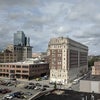Presumption bill pivots on place of COVID-19 infection
 Photo | Courtesy of Commonwealth of Massachusetts
Massachusetts State House
Photo | Courtesy of Commonwealth of Massachusetts
Massachusetts State House
Employees in public-facing jobs or working outside their homes who contract COVID-19 would be presumed to have caught the virus at work and eligible for workers compensation benefits under legislation aired at a public hearing Tuesday and knocked for its likely negative impact on insurance rates.
The bill (H 1986) comes after a year of living in a pandemic where a host of frontline employees like health care workers, grocery store clerks, law enforcement officers, and nursing home aides have stayed at work to help keep essential services running.
Public Service Committee Co-Chair Kenneth Gordon, the lead sponsor of the bill, said the problem many workers face is proving that an exposure to COVID-19 occurred at work. The Bedford Democrat said constituents have recounted to him how they were working in a public-facing job, contracted the virus, and were required to prove that they caught it at work to receive benefits from employers.
"Because they can't prove exactly where they came into contact with the virus, it became an insurmountable challenge to them to be able to receive comp benefits," he said Tuesday during a Labor and Workforce Development Committee hearing on the bill. "After all, they could have received it at the grocery store, at the dentist, while walking the dog, I mean anything is possible."
The bill creates a "rebuttable presumption" that the employee contracted the virus at their workplace and are therefore eligible for benefits under worker compensation statutes. Gordon said employers could rebut the claim if they have sufficient evidence "that it's just as likely that the contact to the virus occurred someplace other than work."
That could include employers finding social media posts showing workers attending parties, crowded bars, or other locations that are at odds with the advice of the Centers for Disease Control or state guidance.
Gordon said the legislation, if approved, would also protect workers who are infected with COVID-19 during the state of emergency and suffer long-term effects well after the pandemic ends.
The legislation allows employees to file workers compensation claims within four years "of the discovery of any condition caused by exposure to the COVID-19 virus or any loss of employment due to said exposure or period of quarantine or self-quarantine resulting therefrom," the bill states.
"This bill applies to all industries because I don't want to pick and choose the type of worker who deserves this protection and the type that does not," Gordon said.
Christopher Carlozzi, state director for the Massachusetts Small Business Association, said workers compensation benefits were not designed for community spread illnesses like COVID-19 because it is "incredibly difficult" to prove a person contracted the virus at work.
"We are all painfully aware of the highly infectious nature of the virus, which meant it could be contracted anywhere: public transportation, out for a jog, at a family barbecue, watching the game with some friends, not necessarily in the workplace," he said at the hearing. "This legislation could lead to spikes in insurance rates for any employers with workers diagnosed with COVID even though it would prove near impossible to demonstrate the employee contracted the virus in the workplace."
The bill, Carlozzi said, would "unfairly" leave employers with little recourse in instances where employees are diagnosed with the virus.
"[Employers] will lack the ability to prove the virus was contracted in locations other than the workplace like on a train or at a family function," he said. "Instead, Massachusetts should work like more than half the states in the nation to pass liability protection laws for businesses that followed all the guidelines and rules put in place by the state, the federal government, or municipalities."
Gordon filed similar legislation (H 4739) last session that applied to health care facility employees and essential workers in grocery stores. The Legislature ultimately sent the bill to study, effectively negating any possibility of it becoming law.
Rep. Tram Nguyen also filed a related occupational presumption bill (H 2031 / S 1194) that specifically focuses on health care workers who contract COVID-19.
"We really do need to work to make sure that we're giving workers access to necessary benefits such as workers compensation, not only now during the pandemic, but afterwards," the Andover Democrat said at the hearing. "For this particular bill, I am concentrating on health care workers who have contracted or may be exposed to COVID-19 and being told that they did not get the virus at work."








0 Comments